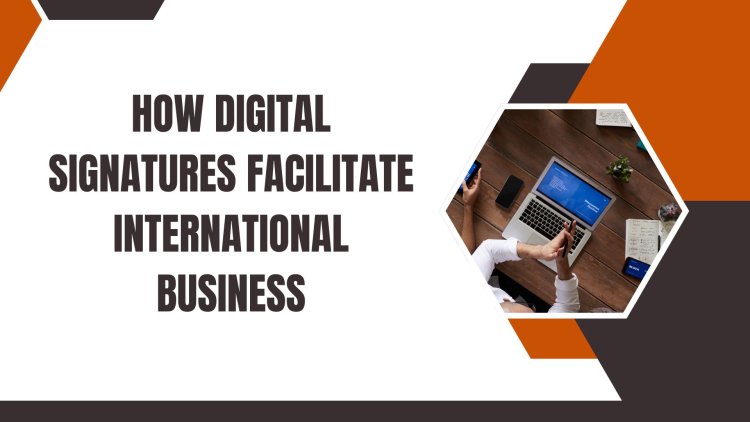How Digital Signatures Facilitate International Business
Digital signatures are transforming the way businesses conduct international transactions. By improving efficiency, enhancing security, reducing costs

In today’s fast-paced digital world, businesses are no longer confined to one location or country. With the rise of global commerce, international business transactions have become more accessible than ever. The digital signature is one tool that makes these transactions smooth, secure, and efficient.
A digital signature is an electronic signature that uses cryptographic techniques to provide security and authentication for online transactions. It is as legally binding as a traditional handwritten signature and can replace the physical process of signing documents.
This article will explore how digital signatures facilitate international business by improving efficiency, enhancing security, reducing costs, and fostering trust between companies from different countries.
How Does a Digital Signature Work?
Digital signatures rely on public key cryptography, also known as asymmetric cryptography. This method uses a pair of keys: a private key and a public key.
-
Private Key: The signer uses their private key to sign the document. This key is kept secret and is only known to the signer.
-
Public Key: The document's recipient uses the sender’s public key to verify the signature. The public key is shared freely; anyone can use it to verify the signature’s authenticity.
Benefits of Digital Signatures
1. Efficiency in International Transactions
In the past, international business transactions involved a lot of paperwork. Business contracts, agreements, purchase orders, and invoices had to be physically signed, which meant that documents had to be printed, signed, scanned, and sent through mail or courier services. This was time-consuming and prone to delays, especially when the parties were located in different countries.
2. Enhanced Security and Fraud Prevention
Security is a major concern in international business. Sending sensitive documents over the Internet, especially in cross-border transactions, exposes businesses to the risk of fraud, document tampering, and identity theft. Digital signatures provide a significant advantage in this area.
3. Cost Savings
In traditional international business transactions, businesses often incur significant costs related to printing, courier services, and mailing fees. Additionally, manual document signing and handling can require more time, increasing the cost of operations. These costs can add up, especially when dealing with numerous international contracts and documents.
4. Legal Recognition Across Borders
One of the challenges in international business is ensuring that contracts and agreements signed in one country are legally recognized in another. Different countries have different laws regarding what constitutes a valid signature. This can create confusion and delay in the enforcement of agreements.
5. Environmental Benefits
Another important aspect of digital signatures in international business is their positive environmental impact. Printing, shipping, and storing paper documents has a significant environmental cost. It leads to deforestation, increased carbon emissions from transportation, and the consumption of energy and resources in producing paper.
6. Improved Business Relationships and Trust
Trust is a key factor in any business transaction, especially with international partners. When businesses from different countries engage in cross-border deals, trust becomes even more critical. Both parties need to feel confident that their interests are protected and that they are dealing with reliable and trustworthy partners.
7. Global Compliance
International businesses must comply with various regulations and standards in their countries. These regulations often require firms to use secure methods for signing documents, especially in industries such as finance, healthcare, and government contracting.
How to Obtain a Digital Signature
-
Visit Our Website: Go to our website to begin.
-
Fill in Your Details: Choose user type (individual or organization), certificate type (signing or signing & encryption), validity, and provide personal details. Agree to the terms and submit.
-
Choose Token Option: Select if you need a new USB token or already have one.
-
Make Payment: Enter payment details and choose a payment method (net banking, card, or UPI).
-
Complete the Process: Review your details and submit the form. Wait for a confirmation email.
-
Get Your Digital Signature: Receive your digital signature on a USB token after processing.
Suggested Read – Class 3 Digital Signature Certificate For eTender
Conclusion
Digital signatures are transforming the way businesses conduct international transactions. By improving efficiency, enhancing security, reducing costs, and fostering trust, digital signatures play a key role in the globalization of commerce. Businesses can now easily enter into cross-border agreements, knowing that their transactions are secure, legally binding, and recognized worldwide.
As technology advances and international trade becomes more interconnected, the use of digital signatures will only grow in importance. Businesses that embrace this powerful tool will be better positioned to thrive in the global marketplace, gaining a competitive edge while promoting efficiency, security, and sustainability.
In summary, digital signatures are both a convenience and a necessity for modern international business. They simplify processes, safeguard transactions, and contribute to the overall success of global commerce.
What's Your Reaction?















.jpg)
.jpg)

